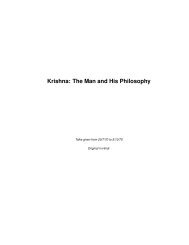Hyakujo: The Everest of Zen, with Basho's Haikus - Oshorajneesh.com
Hyakujo: The Everest of Zen, with Basho's Haikus - Oshorajneesh.com
Hyakujo: The Everest of Zen, with Basho's Haikus - Oshorajneesh.com
You also want an ePaper? Increase the reach of your titles
YUMPU automatically turns print PDFs into web optimized ePapers that Google loves.
CHAPTER 3. IN SEARCH OF A LOST TREASUREIf we can perceive something, it means that when something will be removed, we will perceivenothing.<strong>The</strong> question continues: ”BUT HOW CAN THERE BE PERCEPTION WHEN WE ARECONFRONTED BY NOTHING AT ALL?”HYAKUJO ANSWERED BY SAYING: ”WE ARE NOT TALKING OF THAT PERCEPTION WHICH ISINDEPENDENT OF THERE BEING AN OBJECT OR NOT. HOW CAN that BE?””THE TRUE NATURE OF PERCEPTION BEING ETERNAL, WE GO ON PERCEIVING, WHETHEROBJECTS ARE PRESENT OR NOT.”A mirror can exist <strong>with</strong>out reflecting. Just take that case, that a mirror can exist <strong>with</strong>out any reflection.A consciousness can exist <strong>with</strong>out any perception. <strong>The</strong>re is no need, no necessity. <strong>The</strong> mirror andits mirror quality is not dependent on anything and its reflection. For example, the lake can go onexisting whether the moon <strong>com</strong>es or not. If it <strong>com</strong>es, it will be reflected; if it does not <strong>com</strong>e, whocares? <strong>The</strong> lake is perfectly satisfied unto itself, so is the case <strong>of</strong> the inner lake <strong>of</strong> consciousness.”THEREBY WE COME TO UNDERSTAND THAT, WHEREAS objects NATURALLY APPEAR ANDDISAPPEAR, THE NATURE OF PERCEPTION DOES neither OF THOSE THINGS.”<strong>The</strong> mirror remains; things <strong>com</strong>e and go. Consciousness remains, awareness remains, witnessingremains; things <strong>com</strong>e and go. Life <strong>com</strong>es, death <strong>com</strong>es, your mirror-like witnessing remainseternally. It is the only thing in the whole <strong>of</strong> existence which never changes.Basho wrote:AUTUMN EVE – PLEASETURN TO ME.I, TOO, AM A STRANGER.Basho’s haikus have no parallel. All <strong>Zen</strong> masters have written haikus, but Basho seems to havemelted and merged into nature more deeply than anybody else.”Autumn eve – please turn to me. I, too, am a stranger.” Just as you are, he is saying, ”Here in thisworld we are all strangers.”We ordinarily forget the matter, we start taking everybody for granted. Have you ever thought aboutit? <strong>The</strong>se ten thousand buddhas are all strangers. We make efforts to forget that everybody is astranger – we make marriages, friendships, we try to introduce each other – just to forget the feelingthat everybody is a stranger. It will make us very much frightened, that we are surrounded <strong>with</strong>strangers. All our families, all our clubs, all our religions, all our nations are only an opportunity tohide the fact that we are all strangers.<strong>Zen</strong> is an effort to make you fully aware <strong>of</strong> your strangeness. This will give you freedom from thecrowd. This will give you a sense <strong>of</strong> being yourself, a deep intensity <strong>of</strong> consciousness that you aresurrounded in a strange world where everybody is a stranger.<strong>Hyakujo</strong>: <strong>The</strong> <strong>Everest</strong> <strong>of</strong> <strong>Zen</strong>, <strong>with</strong> Basho’s <strong>Haikus</strong> 44 Osho
















